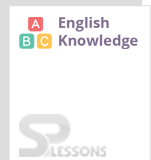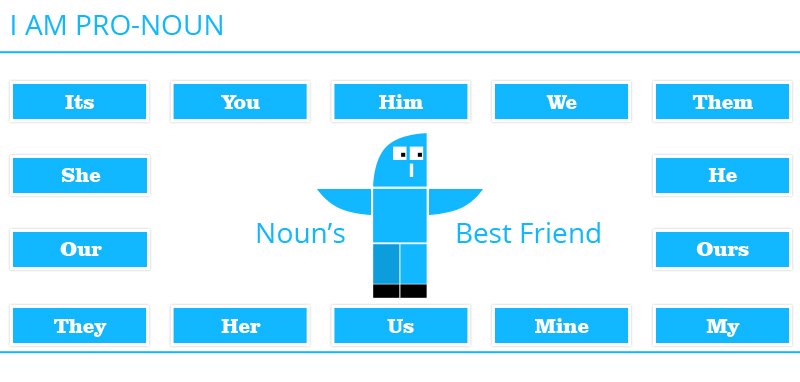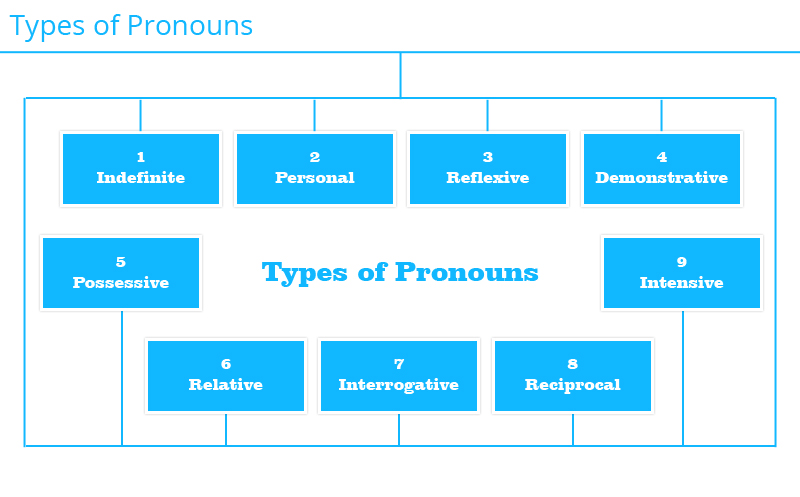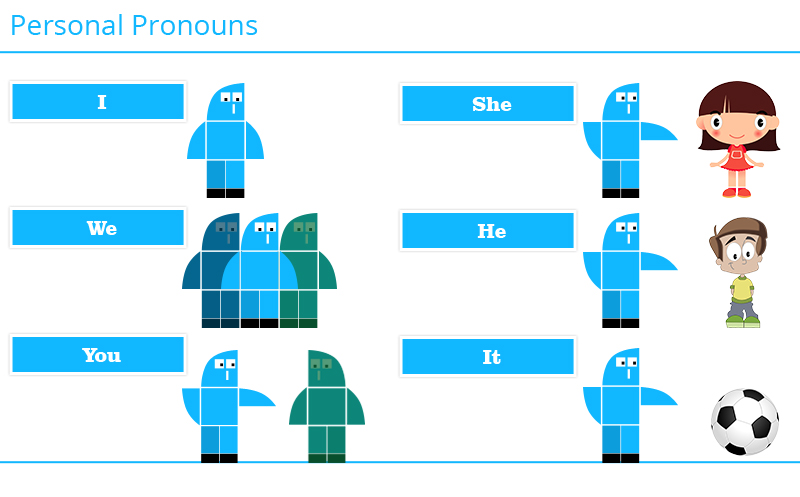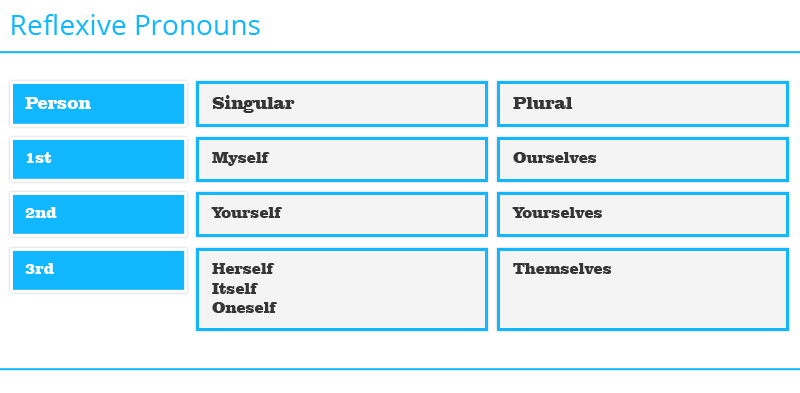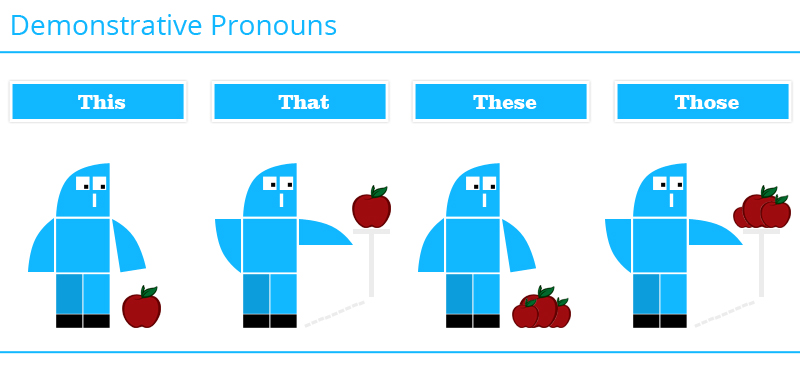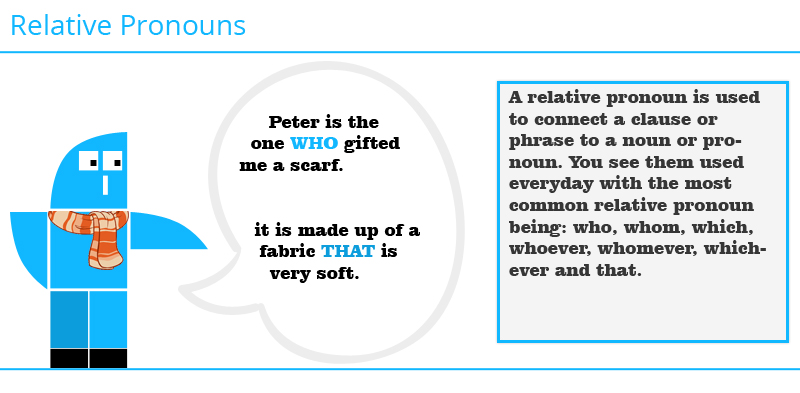 Pronouns
Pronouns
Pronouns are words or phrases that are used as a substitute for a noun so it is not necessary to use noun again and again in a sentence. Using Pronoun brings elegance to the subject and makes the writing structure well-organized.
Examples of pronouns:
- Raman is unwell, so she will not go to school today.
- Ram is a football player he won many trophies for his school.
- Sham is a good boy he treats everybody with respect.
 Types
Types
There are different types of pronouns:
Indefinite Pronoun:
Word which replaces a noun, but not one specific pronoun is known as indefinite pronoun.
Examples of Indefinite pronouns:
Examples of possessive pronouns:
Examples of interrogative pronouns:
Examples of reciprocal pronoun:
Example of intensive pronoun:
- All are invited to the birthday party tonight.
- Raman gave that pen to someone and never got it back.
- Everyone had a great time at the wedding party.
- Raman is a good writer she wrote many books.
- Sham is an athlete he runs very fast.
- He wanted to make her happy, so he cooked the dinner himself.
- You have to complete all your homework all by yourself.
- This dress is so pretty.
- That bag belongs to her.
- These flowers are lovely.
- Those were the days.
| Subject | Object | Adjective | Possessive |
|---|---|---|---|
| I | Me | My | Mine |
| You | You | Your | Yours |
| He | Him | His | His |
| She | Her | Her | Hers |
| It | It | Its | Its |
| We | Us | Our | Ours |
| They | Them | Their | Theirs |
- This pen is mine, not yours.
- Your dress is more beautiful than mine.
- I didn’t have book, so she lent me hers.
- I saw the cat which drank the milk.
- The thief who stole your bag is in the lockup.
- Mr. Cruz, who runs a sweet shop, is sitting outside.
| Question | Answer | |
|---|---|---|
| Who told you? | John told me. | subject |
| Whom did you tell? | I told Mary. | object |
| What's happened? | An accident's happened. | subject |
| What do you want? | I want coffee. | object |
| Which came first? | The Porsche 911 came first. | subject |
| Which will the doctor see first? | The doctor will see the patient in blue first. | object |
| There's one car missing. Whose hasn't arrived? | John's (car) hasn't arrived. | subject |
| We've found everyone's keys. Whose did you find? | I found John's (keys). | object |
- What is your name?
- Which city do you live in?
- Who is your sister?
- To whom you are talking to?
- Whose car is this?
| Reciprocal Pronoun | Rule | Examples |
|---|---|---|
| each other | use when the group consists of just two people, animals or things | two friends helped each other throughout their university years |
| one another | use when the group consists of more than two people, animals or things | the team members always cooperate with one another |
- Ram and sham were talking to each other over the phone.
- We give each other gifts during the festivals.
- The culprits were blaming each other for the crime they were charged with.
| Condition | Personal Object Pronoun | Reflexive/Intensive Pronoun |
|---|---|---|
| When First person is singular | Me | Myself |
| Second Person Singular | You | Yourself |
| Third Person Singular Male | Him | Himself |
| Third Person Singular Female | Her | Herself |
| Third Person Singular Neuter | It | Itself |
| First Person Plural | Us | Ourselves |
| Second Person Plural | You | Yourselves |
| Third Person Plural | Them | Themselves |
- He will do it himself.
- I heard the cries myself.
- The president himself attended the wreath laying ceremony.
 Rules
Rules
Different rules to follow while using pronoun:
Rule 1: Pronouns when used as the subject of the sentence are called subject pronouns.
Example: I, he, we, they, who are all examples of subject pronouns.
Are you talking to me? (Here object of the preposition is ‘Me’)
Rule 5: The singular and plural verbs depend on whether the subject is singular or plural. If subject is singular then singular verb, if subject is plural then plural verb.
For example:
- He did the work.
- Give (to) her the pen.
- Do (for) me a favor.
- He is the only one of those teachers who is always on time. (The word who refers to the single individual. Therefore, use the singular verb is.)
- She is one of those women who are always on time. (Here the word who is referring to the women. Therefore, always use the plural verb “are”.)
- Each of the boys dances well.
- Either of us is efficient enough of doing this job.
- Neither of them is available to complete the task.
- Raman is as good looking as she/her.
- Sham is shorter than I/her.
- Raj would rather talk to her than I/me.
- Raj would rather talk to her than to me. OR
- Raj would rather talk to her than I would.
- It’s been a cold night.
- She’s the one who’s always punctual.
- He’s the one whose kids are always on time.
- Raman helped herself.
- If the object of a preposition refers to a previous noun or pronoun then use a reflexive pronoun.
- Sham bought it for himself.
 Errors
Errors
Some common mistakes done while using pronouns are as follows:
Incorrect: Each of these players play cricket well.
Correct: Each of these players plays cricket well.
Incorrect: Each of these four roads lead to the mall.
Correct: Each of these four roads leads to the mall.
(After each of we use a plural noun or pronoun and a singular verb.)
Incorrect: Both didn’t sleep.
Correct: Neither slept.
(While framing negative sentences, we usually use neither rather than both.)
Incorrect: We all were not ready for the party.
Correct: None of us were ready for the party.
(Use of none is appropriate while explaining negative sentence in-spite of all.)
Incorrect: Each teacher and each student were given a book.
Correct: Each teacher and each student was given a book.
Incorrect: My all novels are lost.
Correct: All of my novels are lost.
Incorrect: Let he go.
Correct: Let him go.
Incorrect: Let we dance.
Correct: Let us dance.
Let is a verb, which is accompanied by an objective pronoun.
Incorrect: Your house is bigger than me.
Correct: Your house is bigger than mine. OR
Correct: Your house is bigger than my house.
Incorrect: Whoever performs the best he will get a prize.
Correct: Whoever performs the best will get a prize.
Incorrect: I and she are sisters.
Correct: She and I are sisters.
Incorrect: I and Tony are friends.
Correct: Tony and I are friends.
Pronouns ought to dependably go in the best possible request – the individual addressed, first; the individual talked about, second and the speaker, third.


